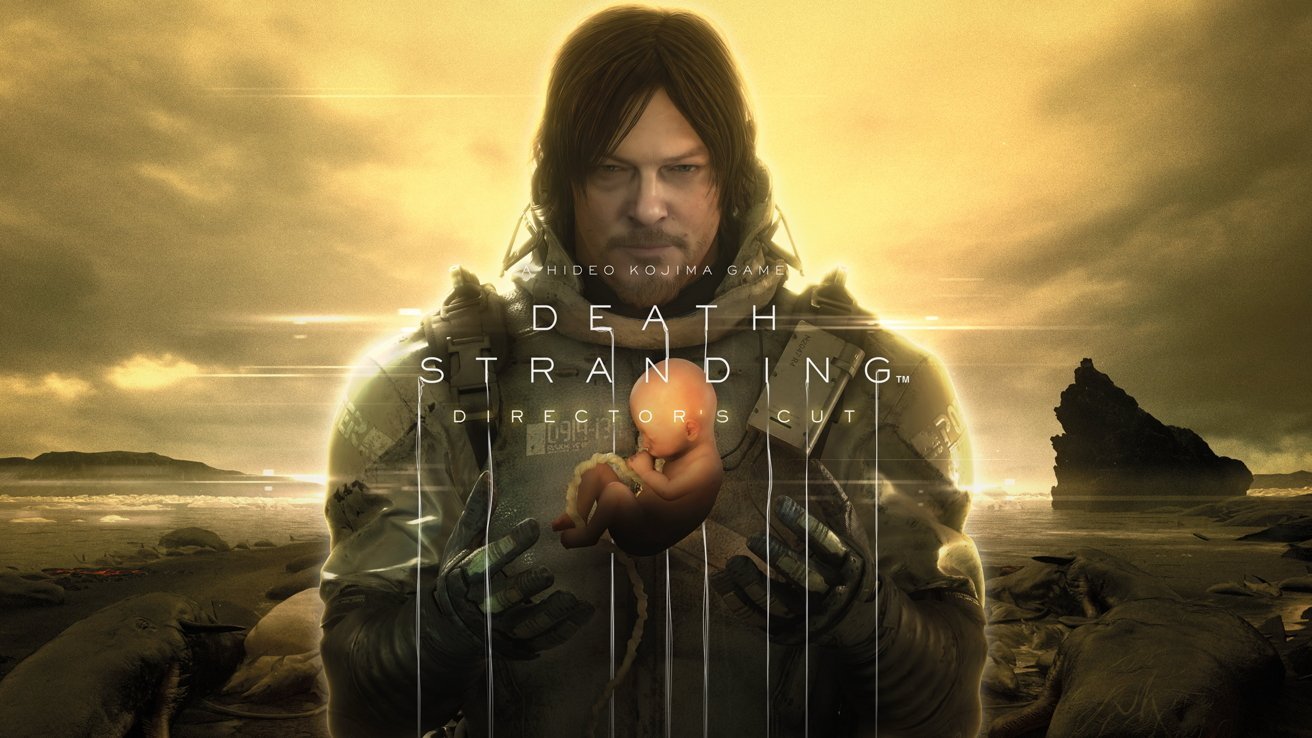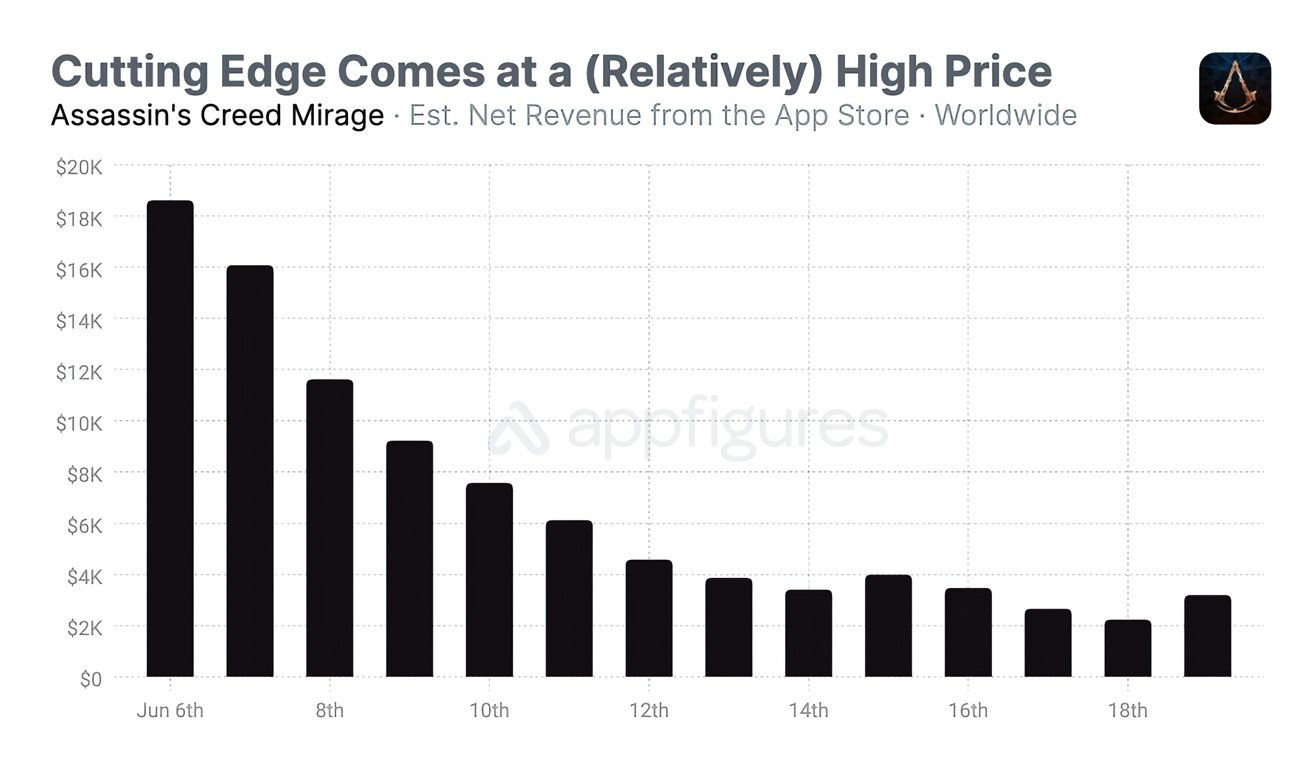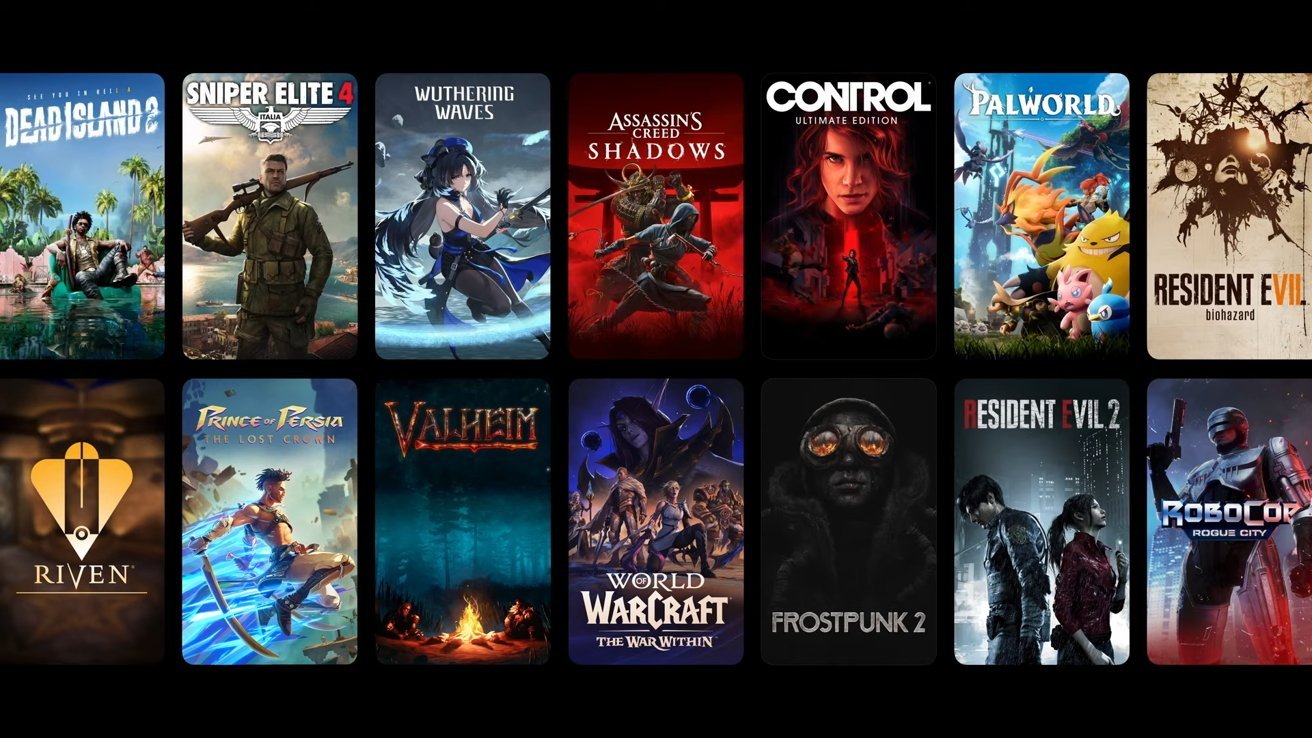 500
500
 2024-06-27
2024-06-27

Confirming the fairly obvious, analysis of major iOS game launches including "Death Stranding" and "Assassin's Creed Mirage" has revealed that pricing games at console levels simply doesn't work in the App Store.
Gaming is a big earner for Apple's App Store. Apple's Q1 revenue for the App Store hitting $13 billion, mostly because the iPhone continues to be the world's largest addressable gaming market.
While mobile gaming is big business, attempts to bring actual console games to the platform continue to fail.
Apple has tried to paint its ecosystem as a great platform for game development. It even managed to convince the developers of games such as "Assassins Creed Mirage," "Death Stranding," and the "Resident Evil" series to release them on iPhone and iPad.
Analysis of the games by MobileGamer.biz using data from Appfigures and Appmagic indicates that there have been astoundingly few purchases of each title in the App Store.
Very few payers
Assassin's Creed Mirage was downloaded approximately 123,000 times since June 6, Appfigures says. However, it has only managed gross revenue of $138,000.
The report believes that the revenue level indicates that fewer than 3,000 people were willing to unlock the full game at $49.99.

The game performed worse than a previous made-for-mobile release. Assassin's Creed Rebellion launched in November 2018, but managed 1.9 million downloads and $981,000 in revenue for the same post-launch period.
More damning is that Rebellion saw revenue grow 82% over the launch period, versus a 79% decline for Mirage.
The only people who will know the real numbers are Apple and Ubisoft, but the figures aren't off by an order of magnitude that would be required for the ports to recoup labor costs for the port. Another firm offered higher, but still dismal, numbers of 279,000 downloads and $221,000 in revenue for Mirage.
There is a disparity, but it's still close enough to demonstrate that the sales of Mirage hasn't yet reached the millions of dollars level.
More gaming bombs
The problem isn't just felt by Ubisoft. Others that Apple prominently featured in its presentations have suffered a similar fate.
Resident Evil 4 has been downloaded 357,000 times, analysts say, with revenue of just $208,000. At a $29.99 price to unlock, about 7,000 people actually paid for the full game.
Resident Evil 7 managed to hit 817,000 downloads, said Appmagic, and $420,000 in revenue. With a cheaper $15.99 price, that equates to about 34,000 people paying for it.
Death Stranding has also failed to capture the audience, earning $348,000 to date. Requiring an up-front purchase of $19.99, the game hasn't been downloaded enough to be listed by Appfigures, but it probably managed just 23,000 sales.
Painful price points
The biggest problem these AAA-style releases on iPhone has relates to money, and it's something the analysts agree on. With premium mobile games priced at between $5 and $10, along with a sea of titles offering free-to-play gaming, that makes for a tough market for a high-priced game to penetrate.
There's also the allure of console gaming that can get in the way.
"Players who can afford flagship mobile devices and $50 for games are likely to have the resources to enjoy games on PC and console as well," said Appmagic's Andrei Zubov. "On the other hand, players who can't afford gaming devices or high-performance mobile phones are less likely to make a one-time $50 purchase.

Appfigures' Randy Nelson adds that the iPhone 15 Pro models and similar smartphones have made "enormous progress towards technological parity with current-gen consoles." However, Nelson fears that consumers may not actually know about the performance gains on mobile.
"It's uncertain how many actually realize it and consequently even consider they might be able to play the latest Resident Evil or Assassin's Creed on their phone," he continued.
An expensive experiment
Apple has introduced more performance to its devices over the years, and has really started to make a push for gaming. Not only on mobile, but also to get more games to work on Mac using tools like the Game Porting Kit.
During WWDC, it introduced a second-generation version of the kit, as well as how multiple titles will be brought to the platform in the future.
As for the developers and publishers witnessing the relatively small trickle of sales, this could sway some away from continuing on the platform if it doesn't improve.
That said, the aforementioned AAA games aren't necessarily the most expensive ones to produce on an iPhone or iPad.

With games often built for multiple platforms at once, in part thanks to cross-platform tools like the Unreal Engine, developers can make games for multiple consoles and for PC at the same time.
In the case of games like Death Stranding, the various graphical resources and media needed for it already exist for the console versions. It seems like it's a big-budget endeavor, but the money's already been spent on the non-iPhone versions.
Bringing AAA games to mobile therefore doesn't require a complete rebuild of the game from the ground up in the majority of cases. Changes to the interface, as well as some in-game elements to adapt it to touchscreen gaming, still require programmer labor, though, to the tune of hundreds of thousands of dollars for the complete job.
At these low levels of revenue, the publishers have so far lost money on their investments. But, given that games could cost tens or hundreds of millions of dollars to produce, mobile ports can be a drop in the financial ocean.
Ports cost money to produce, but far from the cost of making an entire game from scratch.
There's also the prospect of AAA mobile gaming becoming more accepted by gamers as time moves on. With more major titles arriving on iOS and iPadOS, as well as Mac, this makes Apple's ecosystem seem more like a legitimate gaming platform.
Even so, it's a struggle at the moment as the AAA ports are only really playable on Apple's flagship models of iPhone and iPad. This automatically reduces the potential sales compared to having wider iPhone compatibility.
It also doesn't help that, in these particular cases, we're talking about games that have seen success on consoles quite some time ago. Death Stranding originally shipped in November 2019, Resident Evil 4 was first released in January 2005, and Resident Evil 7 went on sale in 2017.
The games only really had Apple's announcements as the marketing for the ported versions, with little other real-world advertising. You could expect that, if launched alongside the console editions and benefiting from the increased multi-platform marketing efforts, there would also be more sales.
It certainly won't happen overnight for the market. But, if the pricing issue is worked out and with enough titles available, it could one day become a viable option for gamers instead of the latest console.
So long as those who make the games can bear to wait that long.
Source: AppleInsider